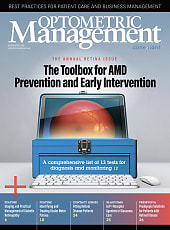In his book “The 7 Habits of Highly Effective People,” Stephen Covey discusses the phrase “Paradigm shift,” which moves us from seeing what we always have seen to seeing something new. He uses this example to demonstrate the concept: One Sunday morning he was on a New York subway when his peaceful ride was interrupted by “loud and rambunctious” children. Covey asked the children’s passive father to please attempt to calm them. The father replied that he probably should try, however, the children’s mother, his wife, had died just prior, and none of them knew how to handle it. Covey shares how in that moment he saw the situation differently and so he thought, felt, and behaved differently by wanting to help the father, vs. chastise him.
A personal "paradigm shift"
I experienced my own “Paradigm shift” after being hospitalized for meningitis 20 years ago. My outcome was good (I am still alive), however, my time in the hospital was mentally traumatic due to a lack of empathy from everyone I encountered there.
As a result, I vowed that my practice would forever keep empathy toward patients top of mind. I do this by reminding myself daily that every patient, no matter the challenge they may bring or the challenges I may bring with me, deserve my understanding and compassion.
The value in shifting
Recently, I had an experience that reminded me of the value of this “Paradigm shift.” Specifically, my front desk staff warned me about an extremely rude patient who presented for her annual eye exam. As predicted, this patient was very brusque with me. Regardless, I treated her with the same respect as I do all my patients.
A few minutes later, the pa-tient’s attitude transformed to melancholy, as she confided she had just learned her cancer returned for the third time. We cried together, and I told her about some colleagues who had been through her same situation and came out on the other side of it. We both knew this may not be her outcome, but just being able to talk through it with someone who cared made the moment easier and gave her hope for the future.
Consistency isn’t easy
As time goes by, we risk falling into the trap of going through our days dispassionately and rotely, not actually seeing the patient in front of us and not truly hearing them. Some call it burnout, and some call it apathy. I call it a cry for help. In a study on clinical empathy, the authors suggest that, instead of a complete detachment strategy from patients, “physicians need to ‘practice’ an emotional attunement [using] clinical empathy.”1 They add that “empathy can create satisfaction at work for the provider and help them find meaning in their professional activity.” I wholeheartedly agree.1 Besides, I never want anyone to feel how I did those 20 years ago when I was battling meningitis. OM
Reference:
1. Zenasni F, Boujut E, Woerner A, Sultan S. Burnout and empathy in primary care: three hypotheses.
Br J Gen Pract. 2012 Jul;62(600):346-7. doi: 10.3399/bjgp12X652193.
Email: april.jasper@conexiant.com
X: @DrAprilJasper
Facebook: @OptometricManagement




